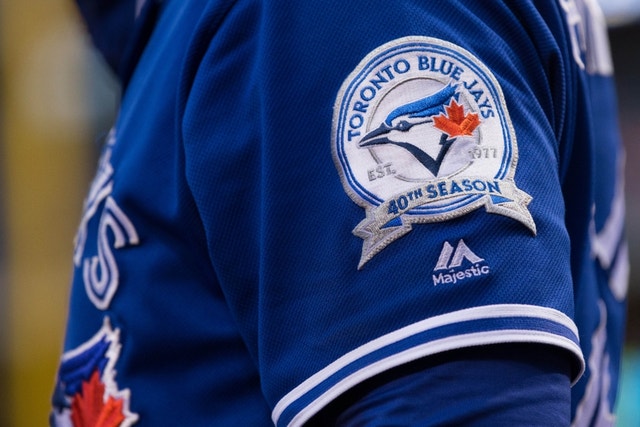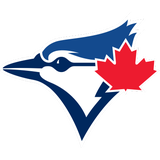
Blue Jays outfield targets: The Wild Card, Eric Thames

Eric Thames, the former Toronto Blue Jays outfielder, has played his last three professional seasons in Korea
The Toronto Blue Jays have every reason to enter free agency looking through a wide lens. With multiple openings in their outfield and bullpen, not all solutions for the Blue Jays will be simple.
General manager Ross Atkins acknowledged this recently, suggesting that the team could explore players not currently playing domestically among their many strategies.
One name that continues to hold the attention of Blue Jays fans — largely due to the nostalgia for an old friend and some eye-popping numbers overseas — is the 29-year-old Eric Thames.
After being drafted by the Blue Jays in 2008, Thames debuted with Toronto in 2011 and hit 12 home runs in 95 games. His .769 OPS, youth, tree-trunk-thick arms and Wolverine-esque facial hair made him a fan favourite, but when his bat cooled slightly in 2012, he was dealt to the Seattle Mariners for reliever Steve Delabar.
| Year | Age | Tm | Lg | G | PA | AB | R | H | 2B | 3B | HR | RBI | SB | CS | BB | SO | ||||
|---|---|---|---|---|---|---|---|---|---|---|---|---|---|---|---|---|---|---|---|---|
| 2014 | 27 | NC | KBO | 125 | 514 | 443 | 95 | 152 | 30 | 6 | 37 | 121 | 11 | 2 | 58 | 99 | .343 | .422 | .688 | 1.111 |
| 2015 | 28 | NC | KBO | 142 | 595 | 472 | 130 | 180 | 42 | 5 | 47 | 140 | 40 | 8 | 103 | 91 | .381 | .497 | .790 | 1.288 |
| 2016 | 29 | NC | KBO | 121 | 525 | 432 | 117 | 137 | 29 | 3 | 40 | 118 | 13 | 4 | 74 | 103 | .317 | .425 | .676 | 1.101 |
| Fgn (3 seasons) | 388 | 1634 | 1347 | 342 | 469 | 101 | 14 | 124 | 379 | 64 | 14 | 235 | 293 | .348 | .450 | .720 | 1.171 |
Provided by Baseball-Reference.com: View Original Table
Three consecutive seasons with 37+ home runs and an OPS north of 1.100 have made Thames a superstar in Korea. He earned league MVP honours in 2015, where he added 40 stolen bases to his video game numbers. This season, the NC Dinos lost in the Korean Series (equivalent of the World Series) to the Doosan Bears in a 4-0 sweep. Thames’ salary was $1.25 million USD (not including performance bonuses, endorsements, etc.)
There’s a catch, of course. The KBO is notorious for producing these numbers. Thames hasn’t exactly been facing Clayton Kershaw or Andrew Miller, and Korean statistics are highly questionable when it comes to translating back to the Major League game.
Cecil Fielder‘s career is often raised as a loose comparable when searching for an optimistic case, but he left the Blue Jays to join the Hanshin Tigers of the Japan Central League all the way back in 1989. He put on a fireworks show for one year in Japan before returning as one of the MLB’s most feared hitters with the Detroit Tigers.
The KBO has never been an MLB feeder league, though. Typically, a player would move from the KBO to Japan, then land on MLB radars. Jung-ho Kang became the first KBO position player to play in the Major Leagues and has been excellent for the Pittsburgh Pirates. In fact, the KBO is making a quick and strong impression on this side of the Pacific.
Dae-ho Lee, Seung-hwan Oh, and Hyun Soo Kim all played extensively in the KBO earlier in their careers and are adding cost-effective value to their current MLB clubs. Byung-ho Park hasn’t found such an easy path with the Minnesota Twins, going from back-to-back 50 home run seasons in the KBO to a .191 batting average with 12 home runs over 62 games in his debut season.
So, where does this leave Eric Thames? Does the California native have a slight advantage over the names above given his past familiarity with the MLB? Would he even want to leave his stardom in Korea to be a number seven hitter fighting to re-establish himself here?
Projecting the performance of a player transitioning to (or back to) Major League Baseball is still a very inexact science. This is because there is such a small sample size to draw from, so the practice of extracting patterns, or what works and what doesn’t, is still heavily based in assumptions and educated guesses.
There is enough precedent in place, however, to expect that Thames would be able to earn a modest raise on a two-year contract. He left the North American game as a fringe-level player, and certainly has done nothing to decrease his value over the past three seasons.
In terms of raw power numbers and counting stats, a team could reasonably hope for their small investment to return numbers similar to Michael Saunders in 2016. Thames would come with his flaws and represents a defensive uncertainty, but his built-in athleticism and power allow him to run into big names naturally. If he can string those together and translate even a sliver of his KBO performance, all the better for his signing team.
One of the biggest variables remains Thames’ desire to return. There’s also the issue of his recent DUI suspension, which cost Thames the final eight regular season games and one in the playoffs. These are the details and conversations that aren’t as readily available to us as they would be for an MLB player, and must be examined.
Any Blue Jays interest in Thames — as far-off a possibility as that may be — would come down to risk appetite. If Toronto believes that Thames could offer them a similar value to a Melvin Upton Jr., there may not be much appeal at all. If the reward is felt to dramatically outweigh the risk, however, the price shouldn’t be terribly problematic.
More from Jays Journal
This article originally appeared on



